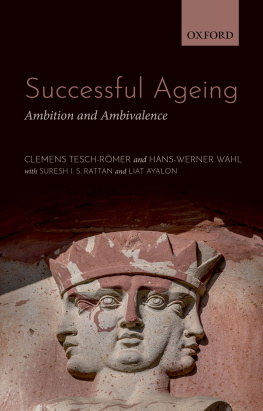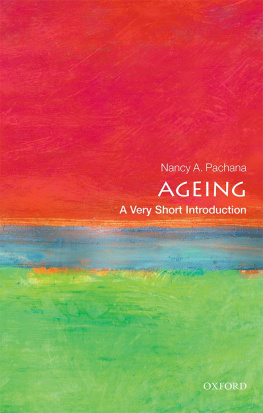AGEING IN AFRICA
Ageing in Africa
Sociolinguistic and anthropological approaches
Edited by
SINFREE MAKONI AND KOEN STROEKEN
First published 2002 by Ashgate Publishing
Published 2017 by Routledge
2 Park Square, Milton Park, Abingdon, Oxon, OX14 4RN
711 Third Avenue, New York, NY 10017, USA
Routledge is an imprint of the Taylor & Francis Group, an informa business
Copyright Sinfree Makoni and Koen Stroeken 2002
The Editors have asserted their right under the Copyright, Designs and Patents Act, 1988, to be identified as the Editors of this work.
All rights reserved. No part of this book may be reprinted or reproduced or utilised in any form or by any electronic, mechanical, or other means, now known or hereafter invented, including photocopying and recording, or in any information storage or retrieval system, without permission in writing from the publishers.
Notice:
Product or corporate names may be trademarks or registered trademarks, and are used only for identification and explanation without intent to infringe.
British Library Cataloguing in Publication Data
Ageing in Africa: sociolinguistic and anthropological approaches
1. Aged - Africa 2. Old age - Africa 3. Language and culture - Africa
I. Makoni, Sinfree II. Stroeken, Koen
305.26096
Library of Congress Cataloguing-in-Publication Data
Ageing in Africa: sociolinguistic and anthropological approaches/ edited by Sinfree Makoni and Koen Stroeken.
p.cm.
Includes bibliographical references and index.
ISBN 0-7546-3004-8
1. Aged--Africa--Cross-cultural studies. 2. Aging--Africa--Cross-cultural studies. 3. Intergenerational relations--Africa--Cross-cultural studies. 4. Gerontology--Africa. 5. Sociolinguistics--Africa. I. Makoni, Sinfree. II. Stroeken, Koen.
HQI064.A35 A376 2002
305.26096--dc21
2002024022
ISBN 13: 978-0-7546-3004-3 (hbk)
Contents
Sinfree Makoni and Koen Stroeken
Monica Ferreira and Sinfree Makoni
Andreas Sagner
Robin Oakley
Koen Stroeken
Steven Van Wolputte
Alexis B. Tengan
Maria G. Cattell
Stella Nyanchama Okemwa
Valerie Mller and Ayanda Sotshongaye
Sjaak van der Geest
Sinfree Makoni
Els van Dongen
Ren Devisen, Sinfree Makoni and Koen Stroeken
Nana A. Apt is Professor and Head of the Centre for Social Policy Studies, University of Ghana, Ghana.
Maria G. Cattell is a Research Associate in the Field Museum of Natural History, Chicago, USA.
Ren Devisch is Professor of Social and Cultural Anthropology, University of Leuven, Belgium.
Monica Ferreira is Professor and Director of the Institute of Ageing in Africa, at the University of Cape Town, South Africa.
Sinfree Makoni is Professor at the Department of African and African American Studies and the Center of Linguistics and Applied language Studies, Pennsylvania State University, USA.
Valerie Mller is Professor and Director of the Institute of Social and Economic Research, Rhodes University, Grahamstown, South Africa.
Robin Oakley is a Lecturer in the Department of Anthropology at the University of Toronto, Canada.
Stella Nyanchama Okemwa is an Academic Assistant in the Department of Social and Cultural Anthropology, University of Leuven, Belgium.
Andreas Sagner is a Lecturer in the Department of African Studies and Ethnology, Ludwig Maximillians University, Munich, Germany.
Ayanda Sotshongaye is employed in Provincial Department of Labour, Pietermaritzburg, South Africa.
Koen Stroeken is a Research Fellow in Anthropology at the Fund for Scientific Research in Flanders, University of Leuven, Belgium.
Alexis B. Tengan is a scientific collaborator in the Africa Research Centre, University of Leuven, Belgium.
Sjaak van der Geest is Professor in Social and Medical Anthropology, University of Amsterdam, the Netherlands.
Els van Dongen is a Senior Staff Member, in the Medical Anthropology Unit, University of Amsterdam, the Netherlands.
Steven Van Wolputte is a Research Fellow in Anthropology at the Fund for Scientific Research in Flanders, University of Leuven, Belgium.
The world as we know it today is changing at an alarming rate. All across the globe the number of older adults is increasing rapidly, even in developing countries. Africa is home to many of the developing countries that will be affected by the increases in the ageing population. The need to understand ageing and the factors that promote health, well-being and independence has never been more urgent. We are all ageing and should celebrate this natural process. For ageing to be a positive experience, longer life must be accompanied by improvements in the quality of life for those who reach that age. This requires policies and strategies that value older peoples insights and societal contributions. Social policies are affected by the demographic composition, the level of productivity of a society and the way in which the social structure operates. This includes assumptions made about human nature, the historical legacy of that society, and the ideologies and values extant in a society. The growing population of older persons and the changing nature of African societies must be an important consideration for future planning in Africa. Priorities need to be set and planning for action needs to begin now, to ensure that older persons in Africa approach the final seasons of life gracefully and with dignity.
Little is known of the needs of older people in Africa. Concerns about population growth, basic health problems and health care provision, mortality and morbidity rates, and infectious diseases, especially the HIV/AIDS pandemic, have dominated collective attention in the continent. Nevertheless, there is still a dire need to increase knowledge and awareness of ageing issues throughout Africa. Africa needs to think about ageing issues, not necessarily about issues of social security and health care, which have been the developed regions failing model at addressing the needs of this growing population, but more information and education which would be meaningful to older people as well as family members as a whole. The generations must be assisted to support each other. This is how Africa had its strength in the decades past and this should be where it draws its strength in the future. Older persons in Africa are not to be taken for granted; they are Africas greatest resource yet. Africa needs their wealth of knowledge, variety of skills, and the strength and ties that they offer to hold together a family, particularly in times of crisis.
Since the current average proportion of older persons in the population is low in Africa, it has encouraged the view that ageing is not an issue of concern. The question I have often been asked and which needs to be clarified here is, Why study ageing in Africa?
Africa is going through a cultural revolution which began with colonialism in the early 19th century and which is transforming the traditional economic, social and political settings of African societies. With the many crises sweeping the continent, partly as a result of this cultural revolution, it is important to analyse the position of older persons in the absence of the traditional social structural system if we are to devise alternative ways that would better accommodate them in the new order of cultural reforms. The sooner this is done before population ageing becomes a problem in Africa, the better in my estimation, and what better way to start than research and studies?





